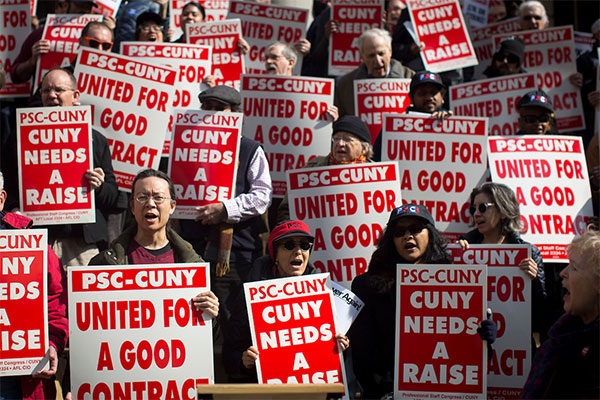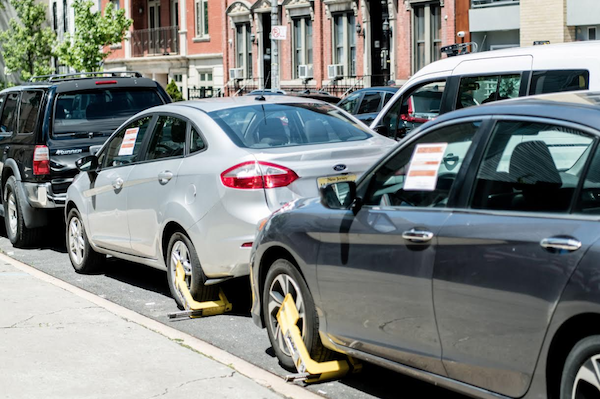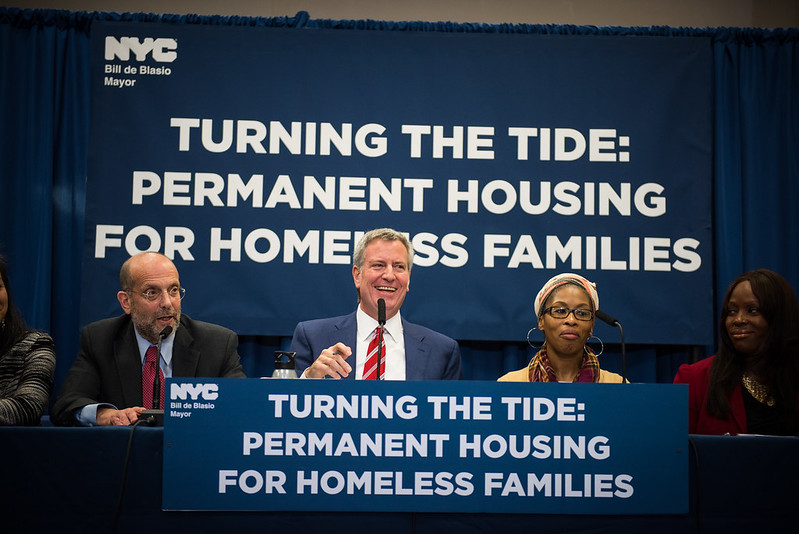A Historic CUNY Labor Contract

(photo: Dave Sanders)
At 2 a.m. on Friday October 18, I walked out of the Manhattan headquarters of the City University of New York (CUNY) having helped to line-edit a labor contract memorandum of agreement (MOA) for the sixth time that day.
I sit on the bargaining team of the Professional Staff Congress, an American Federation of Teachers local that represents some 30,000 employees at CUNY. The bargaining unit includes adjunct and full-time faculty, professional staff, graduate employees, college laboratory technicians, and many others. More than half a million students, a majority working class and people of color, attend CUNY each year.
When I left the building, we had a deal that moved tens of millions of dollars to enhance pay for some 12,000 adjuncts, an accomplishment with national resonance for institutions of public higher education. On top of that, the tentative agreement included significant enhancements for a couple thousand graduate employees.
PSC Delegates are currently discussing the MOA, and will vote on recommending it to the membership on November 7. Assuming the contract is ratified, by Fall 2022, the bottom of the adjunct pay scale at CUNY will move from the current $3,222 per three-credit course to $5,500, for a three-credit course and a paid office hour, a 71% increase.
Adjuncts across the country have been organizing in recent years, at universities like Tufts, George Washington, and many more. They are fighting for better pay, job security, benefits, and other improvements to working conditions. Though adjuncts have long been organized at CUNY, they have faced an uphill battle as decades of austerity have been foisted on the country’s largest urban university by powerful political and financial forces. Yet this round of bargaining represents a significant reversal of the inequality between full- and part-time faculty that has characterized the work life of 12,000 CUNY adjuncts.
One piece of the raise comes from a traditional hourly increase, but the other comes from a so-called “office hour.” Adjunct faculty at CUNY are as dedicated as any to the students they teach. They have long held offices hours and met with students as much as those students need, but mostly without compensation. This new hour of pay for every course begins to recognize the many hundreds of thousands of hours of uncompensated labor that CUNY adjuncts perform every semester.
This wage increase is a moral victory. It will matter in the lives of the 12,000 adjuncts who labor at CUNY, many at the very bottom of the pay scale. But it is also a structural victory that I hope will be repeated throughout the country.
There is not a president, provost, or department chair at our university who will fail to do some basic math and realize that converting adjuncts to lecturers – CUNY’s title for college instructors who have full-time work, job security, and strong benefits, but who do not have a research obligation – will become a much more rational choice with this contract. In this sense, this outcome may mean the beginning of the end of adjunctification at CUNY.
But there is also a host of gains for graduate employees, the group that I (and many others!) have spent the past six years cohering into a political force at CUNY. When we started organizing, membership rates for Graduate Assistants – the title of many though not all graduate employees – were at just 22%. Today, the chapter is vibrant, and membership has increased three-fold. The gains from this round did not come from magic, but rather from the power that comes from dozens and then hundreds and then thousands engaging in union activity.
Starting next semester, those employed at CUNY in their sixth and seventh years of doctoral study will no longer pay tuition if they are New York residents, and will have their tuition reduced by some $2,700 annually if they are not. Gone are the days of getting tagged for exorbitant fees, just as we are trying to finish our dissertations!
The outcome that I am most proud of, though, is the huge step we have made toward eliminating an entire tier of doctoral students – so-called “tuition-only fellows,” who lack stable funding and access to health insurance. CUNY has committed the money to provide health insurance for this entire group, and we will work with the Graduate Center to construct an employment system that will allow them consistent access to these funds. This will require some work – and organizing – in committee, but when we are done, this highly exploited class of graduate sometimes-employees will be eliminated.
There is yet another way to understand the combination of graduate employee and adjunct demands the tentative agreement represents: at the end of this contract, doctoral students who have a standard five-year funding package (which includes a stipend) and who adjunct for their full workload will bring in approximately $50,000 annually.
On the one hand, I do not want to overstate this. As many know, living in New York on even this much money is not easy, and the full workload is a lot. But I don’t want to understate it either. This amount of money enables those from working class backgrounds to obtain a PhD without accruing debt. It is a substantial improvement over current conditions, and we achieved it even while making a huge step toward eliminating altogether the bottom tier of graduate employees.
Union contracts are, in the end, a measure of power. The many good, even transformative, gains in the proposed PSC-CUNY contract are a precise reflection of the power that we have built as members and as an organization. But we did not win everything. Adjunct faculty deserve yet higher wages; we have more work to do to drive home the win for tuition-only doctoral fellows; and a more fundamental political project remains substantially unaddressed: will the city and state directly and fully fund CUNY the way it was when the working class of New York was whiter than it is today?
This is of course a fight – a political project – that extends well beyond CUNY. Institutions of public higher education are under attack everywhere. Our local fights are fundamentally national ones.
Members of the PSC have a lot to be excited about in this proposed new contract. Many of us are taking a moment to celebrate. But tomorrow – later tonight, even – the work continues.
***
Luke Elliott-Negri is a non-teaching adjunct at the School of Labor and Urban Studies and a doctoral candidate at the CUNY Graduate Center, where he is the PSC chapter chair. He serves on the PSC Bargaining Committee, the PSC Pension Committee, and the Working Families Party State Committee.
***
Have an op-ed idea or submission for Gotham Gazette? Email This email address is being protected from spambots. You need JavaScript enabled to view it.
Note: this column has been updated to clarify information around covered doctoral students.
When Inexperience Wins, New York City Loses

(photo via PayLock)
The only thing worse than getting a parking ticket is having your car towed for unpaid fines. For decades, it was the ultimate New York hassle: spend hours looking for your car only to find out you’ve been ticketed, towed, charged a storage fee, and forced to rescue your vehicle from a distant decrepit parking lot.
Driving has its place in New York City, which is why there are two million registered cars in the city. With those cars comes tens of millions of dollars in unpaid tickets and fines. That’s why the city embarked on a pilot program in 2012 designed to address motorist inconvenience while increasing the ease and efficiency of collecting overdue fines that help the city pay for schools, parks, and other priorities New Yorkers care about. The idea was to introduce a simple technology designed to end this municipal headache.
Seven years ago, PayLock, where I serve as CEO, presented the city with an innovative solution to the draconian policy of impounding a person’s vehicle for unpaid infractions. Rather than towing, PayLock places a patented immobilizing self-release car boot on a vehicle when they have fines over $350. Once in place, the boot can only be removed after the driver pays their fines.
Through a mobile-friendly website or call center, the driver receives a code to unlock their boot and has 48 hours to return it. As a result, the city gets its money, and motorists get their car back hassle-free within minutes. In fact, PayLock’s focus on making a tough situation better recouped over $50 million in unpaid tickets for the city in 2018 alone.
Sadly, New York City will transition to a new program on Friday, November 1, and New Yorkers should ask why.
Last Spring, the city announced a public request for proposals (RFP) to select a company that would run the program for the next five years. The city called for companies with at least three years of experience to apply. We were happy to put our expertise and technology up against any other company. Our seven year track record in New York would speak for itself. We are the only company in the United States successfully operating in over 20 municipalities, including Los Angeles, Seattle, and Baltimore.
To our amazement, the bid was awarded to a newly formed company called RIS NYC, which was incorporated three months after submitting its proposal to the city and brought together one of the city’s tow truck and parking lot operators.
RIS NYC has never implemented a self-release booting program for any major city. It also appears that the city went so far as to extend the proposal deadline to respond to the RFP several times just to give RIS NYC time to apply. Then it was awarded the contract even though it lacked the one thing the RFP said was most important: experience.
How is it possible that an untested company was selected to run the largest self-release booting program in the country?
This is why PayLock formally submitted protest letters and later filed an Article 78 legal petition to fight an unfair and nontransparent process. We submitted a proposal backed by data and experience. We brought to the table a total of 14 years of experience collaborating with local governments to run self-release booting programs across the country.
In good faith, we continued to improve and add services at no additional cost to New York taxpayers over the course of the past seven years. We have a great working relationship with the city and the many outstanding Department of Finance employees that we work alongside everyday to help make this program a success. These city employees and our own New York City-based team have shown great care for what is best for New Yorkers.
Instead of providing answers, the city has unfortunately moved the goal posts and built an opaque procurement process that leaves New Yorkers scratching their heads. We pioneered this program and remain a committed partner to the city with a proven record of solving a citywide problem, generating revenue, and reducing administrative costs.
The people of New York deserve better. Companies like PayLock, which deliver innovative solutions to large- and small-scale problems, deserve better. New York City and the Department of Finance have a lot of work to do to ensure companies competing for work in the greatest city in the world have the greatest procurement process in the world.
***
Justin Kennedy is the Chief Executive Officer of PayLock.
***
Have an op-ed idea or submission for Gotham Gazette? Email This email address is being protected from spambots. You need JavaScript enabled to view it.
A New Way to Tackle the City’s Homelessness Crisis

(photo: Edwin J. Torres/Mayoral Photo Office)
It’s well-known that homelessness in New York City continues at crisis levels. Roughly 60,000 men, women, and children -- near record-highs, down just slightly from recent years -- are sleeping in the city's homeless shelter system every night. Another estimated 3,500 poor souls are living on the streets and subways mostly because they fear the crime that occurs in the city shelters.
It has gotten so bad in the subway system, which according to the MTA has seen a 23% increase in homeless people present, that Governor Cuomo has declared the MTA must do something about it, insisting on additional MTA police officers and sending the State Police underground.
However, the MTA is a transportation organization and not a social service organization like the city's Department of Homeless Services, which runs the shelters and where I was at one time a deputy commissioner, and the city’s Human Resources Administration, which runs efforts to keep people out of shelter or move them from shelter to housing.
The plan Mayor de Blasio unveiled two years ago was designed poorly and has been a failure; even the very low goal of reducing the population by only 1% a year has not been reached. The plan also promised reduced dependence on costly hotel rooms, however it has been reported that hotel use is actually up by 36% in the past two years. The number of single adults in shelter is up by 60% over the last five years and many of them are being housed in hotels.
In addition, the budget to fight homelessness has skyrocketed to $3 billion a year, according to Comptroller Scott Stringer, and is going higher as a recent contract for two family homeless shelters in Park Slope has revealed that the city is going to pay $10,000 a month per unit for 253 units for a total cost of $30 million a year.
The city's efforts to stem the tide of incoming families by providing free legal counsel and one-shot payments for rent-arrears is not working well enough. For example, on July 30, 161 families arrived at the city's intake centers for families, on August 1 it was 164 families, and 146 families on September 6.
It is apparent that the system is broken and in need of a true makeover. That is why I am suggesting the creation of a Homelessness Review Board to oversee the system.
This board would be made up of 11 members, with five appointed by the Borough Presidents (one each), one by the City Council Speaker, one by the Public Advocate, one by the Comptroller, and three by the Mayor. This board would have oversight of the Department of Homeless Services budget, power to appoint the DHS Commissioner, and approve contracts of over $1 million.
It would be required to hold at least four public hearings a year and issue two reports a year on the status of the homeless system.
This new structure would provide the accountability that is now missing over homelessness policy.
***
Robert Mascali is a former Deputy Commissioner at Homeless Services and former VP for Supportive Housing at Win.
***
Have an op-ed idea or submission for Gotham Gazette? Email This email address is being protected from spambots. You need JavaScript enabled to view it.




